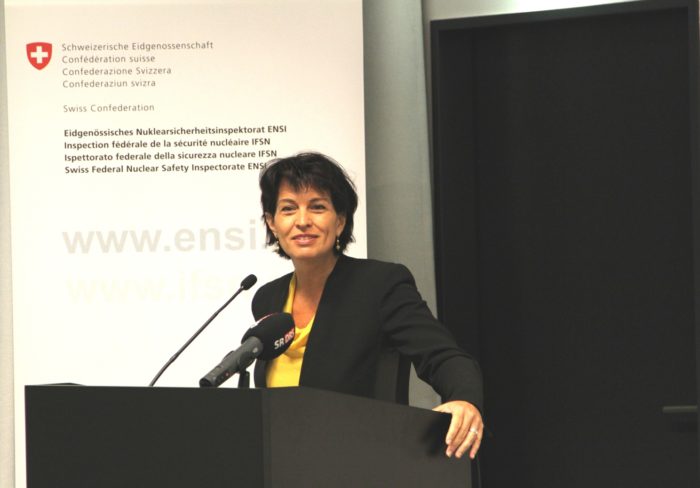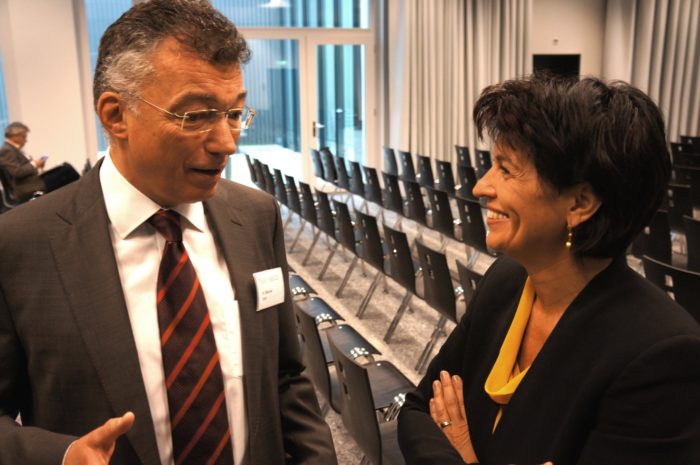‘Switzerland is regarded as very reliable in nuclear matters’ – a commentary by former Federal Councillor Doris Leuthard

The event at the Daiichi nuclear power plant near Fukushima, although far away, had serious consequences for Switzerland and the Swiss energy policy. On the one hand, the three applications for a general licence for the construction of a new nuclear power station, which had been under discussion for years, had to be decided upon and, in so doing, a decision made on future Swiss energy policy. On the other hand, there was the question of the safety of our nuclear power plants in the light of the events at Fukushima. Lastly, safety standards and processes were being challenged.
The Fukushima event occurred at a time when politics was intensively involved with the energy supply of our country. Given the age of the five nuclear power plants (NPPs), the question was whether the three oldest should be replaced by a newer generation of plant. A wide-ranging debate was in progress. Certain cantons were calling for referendums or votes. The Fukushima disaster brought this process to a standstill. At the same time, a window of opportunity opened up for change in the energy strategy toward a diversified, sustainable energy supply.
In the short term, it was a question of assessing whether the disaster would have an impact on Europe and Switzerland. The assessment of the safety situation, daily provision of information both internally and externally to the population, and the checking of actions were key. Lessons had been learnt from the accident at Chernobyl. ENSI performed this well. To make the complexity of the materials understandable to the layman, a communications expert was specifically consulted for support. As we were in an important discussion at the time, the accident was quickly being monitored at political level. Education and transparency were therefore in the forefront.
“ENSI is primarily responsible for reviewing the safety situation in the nuclear power plants. In addition, second and third opinions were obtained; a clear check that our regulatory function is working.”

Both the Federal Council and Parliament had the task of looking closely at the safety situation of our nuclear power plants in the light of the accident and findings relating to it. As the office responsible, the Federal Department of the Environment, Transport, Energy and Communications (DETEC) appointed specialist units in the Swiss Federal Office of Energy (SFOE) in cooperation with the Nuclear Safety Commission (NSC) and others. ENSI is primarily responsible for reviewing the safety situation in the nuclear power plants. In addition, second and third opinions were obtained; a clear check that our regulatory function was working. This was important to me, because Switzerland is regarded as an extremely reliable nation in nuclear matters, and is committed to the highest level of safety. After certain questions arose in respect of Japan and the problems faced there came somewhat as a surprise, Switzerland’s reputation against the international backdrop was extremely important. This was central in being able to justify the public’s confidence in nuclear power plants and their safety. Other than a few corrections, the organisation of the regulator, its expertise and independence were also confirmed.
“With its network and its professionally outstanding reputation, ENSI’s voice was and is listened to at the IAEA. This was and remains important to Switzerland.”
In addition, it was urgently necessary to understand what had gone wrong in Japan, what could have been prevented and what lessons could be drawn from it. We were able to make an impact as part of the International Atomic Energy Agency (IAEA) in Vienna. With its network and professionally outstanding reputation, ENSI’s voice was and is listened to at the IAEA. This was and remains of great importance to Switzerland. Where safety of the nuclear power plants is concerned, it goes without saying that plant licensees are primarily responsible. But because an accident can have such devastating consequences for the whole country and its population, national independent regulation through the auspices of ENSI is all the more important. Information exchange between different regulatory authorities is crucial. That is why we have also called for greater transparency in the respective inspection reports.
“Particularly because an accident can have such devastating consequences for the country and its population, national independent regulation is all the more important.”
Many questions regarding safety came from the Parliament: Do we comply with the IAEA guidelines or do we have higher standards? Are our nuclear power plants strong enough to withstand a plane crash? Do we have any influence on foreign nuclear power plants in neighbouring countries; for example, on the Fessenheim plant in France? How often are tests carried out? How long does an operator have to implement specified actions? Many questions that can only be answered with the benefit of expert know-how. Nevertheless, politics can and should interfere. It must be possible to give clear answers to questions concerning safety standards. Inspection processes must be transparent. The population must be protected at all times. Pressures and influences arising from politics are justified and legitimate. On the other hand, experts must set standards in line with scientific criteria.
“Pressures and influences arising from politics are justified and legitimate. On the other hand, experts must set standards in line with scientific criteria.”
I think that the safety situation and its expert, periodic review have ultimately led to the situation in which – although we are going to exit today’s nuclear technology and hence do not want to build any new nuclear power plants – we can, however, allow existing plants to continue running without them having to be shut down immediately or by a certain date, provided they continue to meet stringent safety standards. The political system is steering a sensible course, it trusts in the high standards, their constant fulfilment by the licensees and their critical inspection by ENSI as the independent federal regulator. The role of the NSC was also upgraded in dealings with the Federal Council and the Department.
Doris Leuthard
Federal Councillor (2006–2018) and Director of the Federal Department of the Environment, Transport, Energy and Communications (2011–2018)

